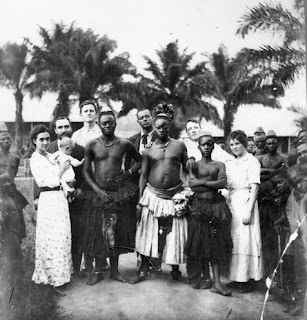During the 19th century, a sudden expansion of European imperialism directed it's attention toward Africa. Due to its rich economic resources, Congo fell under control of Belgium and later became known as the Belgian Congo... but while it all sounds perfectly harmless, European exploitation of the African colonies -particularly Congo- led to one of the most devastating instances of mutilation and death in African history.
King Leopold II: King Leopold II of Belgium was granted control over the Congo River basin, but whereas the other African colonies were controlled by that power's government, the Congo was solely owned and controlled by the King himself. This lasted from 1885 to 1908, where the area was named the Congo Free State, and then was renamed the Belgian Congo when the Belgium Government took control. The most interesting aspect about King Leopold II was that while he depended heavily on the resources and labor involved from his "personal piece of Africa" he never actually visited. Overall he was the primary issue to the havoc and brutal exploitation that occurred in the Congo before their independence in the 1960s.
Source: http://www.ultimatehistoryproject.com/belgian-congo.html
Berlin Conference 1884: Africa was the first place for Europeans to set their sights on, especially because of the economic opportunities that resided there. Between 1884-1885 the Berlin West Africa Conference was held to formalize the division of Africa into "state boundaries" and systems amongst the Great Powers: Great Britain, France, Spain, Portugal, Germany, and several others that held Africa in check for over sixty years.
Source: http://www2.newcanaan.k12.ct.us/education/components/scrapbook/default.php?sectiondetailid=5501
http://www.ultimatehistoryproject.com/belgian-congo.html
African Imperialism: It's interesting to note that before the race to imperialize Africa, there were relatively few colonies spread far and wide across the continent. As a result of acts such as the ones in the Belgian Congo, Africa was considered completely colonized by the 20th century. The image above shows that it's very clear what specific Powers held what portion of Africa; only Ethiopia and Liberia exercised some independence.
Source: http://www2.newcanaan.k12.ct.us/education/components/scrapbook/default.php?sectiondetailid=5501
Belgium Congo Cartoon: This image became one of many that portrayed the brutal injustices wrought upon the Congolese population. Demand in Europe for rubber used for manufacturing automobile and bike tires, and ivory, also another sought after resource all of which were plentiful in the Congo River basin. As a result the natives were forced to collect the ivory and harvest the rubber from their rubber trees. Under King Leopold II the natives retained no rights, and any restriction or law was unavailable. As a result the Conogolese became slaves to their own home, becoming porters, miners, rubber-tappers, woodcutters and railway builders for the growing European presence and to meet the quota that was demanded of Belgium's trade.
Source: http://study.com/academy/lesson/history-of-the-belgian-congo-imperialism-genocide-atrocities.html
Congolese Slaughter: The natives suffered more than the invasion of their homes and traditional ways of life. When force becomes present violence often follows and the Belgian Congo was no exception. If quotas demanded from each village were not met, starvation, kidnappings, beatings, mutilation, and even murder of hostages were the results. The most common incidents were often severing hands from the natives, a permanent reminder of what they did not achieve. The brutal conditions also ended up killing the Congolese as much as the Belgian missionaries who performed all these acts did -between 1880-1903, the Congo population dwindled down from 20 million to roughly 8.5 million people. As a result, the Belgian Congo has been considered a Holocaust, not unlike that of the Jews.
Source: https://wikis.engrade.com/imperialisminthecongo/6
http://study.com/academy/lesson/history-of-the-belgian-congo-imperialism-genocide-atrocities.html
Source: https://wikis.engrade.com/imperialisminthecongo/6
http://study.com/academy/lesson/history-of-the-belgian-congo-imperialism-genocide-atrocities.html
Belgian Missionaries: Though brutal conditions was the major devastation of the natives of Congo, education was also another matter. While the Belgian government held control, they discouraged anything past basic primary education to the Africans, mostly because they believed it unnecessary and that it was not their issue. In the end, missionaries took the role of both religion and education. But despite this, higher education was only given to those who were entering priesthood, so the majority of the Congolese were uneducated, a vast difference from the African colonies under the control of Great Britain and France who had their missionaries founding schools and educational programs. Due to the lack of educated Africans (and of course Congo's wide range of ethnicities), it can be believed that there was no chance for leaders to rise from the Congolese toward independence. Up above are Presbyterian Missionaries in Luebo, Congo with their Bakubac chief.
Source: http://www.ultimatehistoryproject.com/belgian-congo.html
Source: http://www.ultimatehistoryproject.com/belgian-congo.html
Forces Publique: Order had to be enforced in the Belgian Congo, and the one way King Leopold II thought to achieve that was to form his army, made up of native Africans and some Belgian soldiers called the public force or the forces publique. They were the ones in charge of collecting the rubber and ivory quotas from the village, quell rebellions, and enforce the "labor" task assigned to the people of Congo.
Source: http://study.com/academy/lesson/history-of-the-belgian-congo-imperialism-genocide-atrocities.html
Source: https://www.historytoday.com/tim-stanley/belgiums-heart-darkness
https://wikis.engrade.com/imperialisminthecongo/7
Rebellion: Despite the outcry for the genocide of the Africans was heard, not much was done. As a result many of the Africans from varying colonies took it upon themselves to rebel. Resistance was prominent beginning in 1919 and ending in 1923 through several southern districts. Anti-European religious groups formed in the 1920s, and the Great Depression and WW2 only increased tension. It was only time before the increased riots as well as the distracted Belgian government, unable to focus so much of its attention on its Belgian Congo during the war.
Source: https://www.britannica.com/place/Belgian-Congo
William Henry Sheppard, a Presbyterian missionary
William Henry Sheppard, a Presbyterian missionary
Source: http://nvdatabase.swarthmore.edu/content/congolese-win-independence-belgian-empire-1959-60











No comments:
Post a Comment